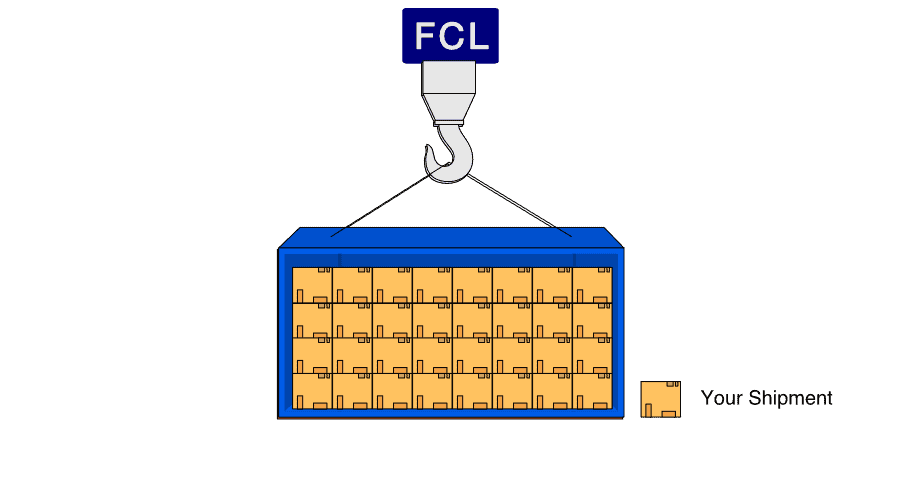- By Della tj
- November 24, 2025
- Sea Freight, Shipping
Shipping heavy or industrial machinery from China to the UK requires precise timing, efficient loading, and effective detention prevention. Managing 20GP FCL detention prevention for machinery from China to UK helps businesses avoid costly demurrage, improve supply-chain flow, and secure faster port clearance.
What Does Detention Mean in 20GP FCL Shipping?
Detention refers to the extra charge when a container is kept beyond its free-use period after unloading or before return.
For a 20-foot FCL container, the free time usually ranges from 7 to 14 days, depending on the carrier.
| Term | Description | Typical Free Days | Extra Charge (USD/Day) |
|---|---|---|---|
| Demurrage | Delay while container is inside port | 5 – 7 days | 80 – 120 |
| Detention | Delay after cargo delivery, container not returned | 7 – 14 days | 60 – 100 |
| Storage | Delay at yard or depot | 5 days | 50 – 80 |
Therefore, avoiding detention requires coordination between shippers, truckers, and customs brokers to return containers on time.
Why Does Detention Commonly Occur in Machinery Shipments?
Delays often arise due to documentation errors, customs inspections, or factory off-loading inefficiencies. Machinery cargo is bulky and requires cranes or forklifts, which extends unloading time.
Additionally, inland delivery to industrial sites across the UK (Manchester, Birmingham, Leeds) increases turnaround duration.
Common causes include:
- Incomplete import paperwork delaying customs release
- Inaccurate HS codes for complex mechanical parts
- Delivery scheduling gaps with local transporters
- Port congestion at Felixstowe or Southampton
- Inefficient cargo unpacking due to lack of onsite equipment
Thus, forwarders offering detention-management programs can save up to 25 % of total logistics costs.
How to Prevent Detention for a 20GP FCL from China to the UK?
The following strategies help reduce detention risk effectively:
- Pre-clear customs before vessel arrival using digital declarations.
- Book unloading slots at the UK warehouse in advance.
- Select combined transport (sea + truck + rail) to shorten transit.
- Ensure importer readiness for immediate unloading.
- Track container return windows via online platforms.
| Preventive Action | Benefit | Recommended Timing |
|---|---|---|
| Early Customs Filing | Avoid port delay | 3 days before arrival |
| Freight Tracking System | Monitor container status | Real-time |
| Route Optimization | Shorter turnaround | Before booking |
| Depot Reservation | Guaranteed return slot | Within free days |
Consequently, forwarders who provide visibility and automation dramatically minimize detention fees.
What Is the Average 20GP FCL Shipping Cost for Machinery from China to UK?
| Route | Transit Time (Days) | Average Freight (USD) | Remarks |
|---|---|---|---|
| Shenzhen → Felixstowe | 30 – 34 | 1,250 – 1,450 | Most stable route |
| Ningbo → Southampton | 31 – 35 | 1,300 – 1,500 | Lower port congestion |
| Shanghai → London Gateway | 28 – 32 | 1,280 – 1,480 | Fast customs channel |
Apart from freight charges, importers should budget for handling, delivery, and possible detention buffer (USD 300–500).
Furthermore, using reliable partners like Top China Freight ensures transparent rate structures and on-schedule cargo release.
Real Case Studies of Machinery Shipments with Zero Detention
🟩 Case 1 – Shenzhen to Felixstowe
Cargo: Industrial compressors – 20 tons / 22 CBM
Mode: 20GP FCL by sea
Transit Time: 31 days
Result: Used pre-arrival clearance and express truck return; saved USD 420 in potential detention.
🟦 Case 2 – Shanghai to London Gateway
Cargo: Precision CNC machines – 18 tons / 20 CBM
Mode: Sea + Rail to Birmingham
Transit Time: 30 days
Result: Digital tracking avoided port hold-ups; no extra charge.
What Documents Help Prevent Detention at UK Ports?
| Document | Function | Importance Level |
|---|---|---|
| Bill of Lading | Identifies shipper and cargo | Critical |
| Commercial Invoice | Specifies value and HS code | High |
| Packing List | Details weight and dimensions | Medium |
| UK Import Declaration | Customs entry for clearance | Critical |
| Delivery Order (DO) | Authorizes container pickup | High |
| Insurance Certificate | Protects high-value machines | Optional but advised |
Indeed, errors in any of these documents can delay container release, so digital verification before vessel ETD is essential.
Need a reliable logistics partner? Share your shipment details and we’ll provide a tailored quotation quickly and accurately.
Which Transport Mode Is Most Efficient for Machinery to the UK?
| Mode | Cost (USD/20GP) | Transit Days | Advantages | Disadvantages |
|---|---|---|---|---|
| Sea Freight (FCL) | 1,250 – 1,500 | 30 – 35 | Low cost, large capacity | Slower schedule |
| Rail Freight | 2,000 – 2,300 | 22 – 25 | Faster, eco-friendly | Limited routes |
| Air Freight | 6,000 + | 5 – 7 | Fastest delivery | Very expensive |
| Sea + Rail Combo | 1,600 – 1,900 | 25 – 28 | Balanced option | Limited space |
Accordingly, exporters prefer sea FCL for heavy machinery due to its stability, while air freight is reserved for urgent parts or spare equipment.
How Can Freight Forwarders Support Detention Prevention?
Professional forwarders implement time-slot management, automated alerts, and return-depot coordination.
They also maintain close communication with UK customs and haulage partners.
| Forwarder Service | Benefit to Importer |
|---|---|
| Container Tracking System | Real-time updates on free-time |
| 24/7 Operations Team | Immediate response to delays |
| Pre-alert Documentation | Prevents customs bottlenecks |
| Local Haulage Network | Quick container return |
| Flexible Free-time Negotiation | Reduces detention risk |
In summary, choosing a forwarder with strong UK-China expertise ensures detention-free delivery and lower total logistics costs.
Conclusion
Efficient 20GP FCL detention prevention for machinery from China to UK relies on proper documentation, accurate scheduling, and experienced forwarders.
Moreover, by integrating digital tracking and customs pre-clearance, companies avoid penalties and ensure timely machine installation.
Ultimately, working with Top China Freight guarantees reliable supply chain performance and optimized container management from origin to destination.
Request a Quote
Need a tailored solution for your shipping from China?Let TJ China Freight Forwarder assist you with reliable, cost-effective service.
FAQ:
Q1.What causes 20GP FCL detention for machinery from China to UK?
Delays in customs clearance, slow unloading, and late container return commonly trigger detention charges on UK imports.
Q2.How can importers avoid detention penalties effectively?
By booking early clearance, tracking containers, and ensuring timely return within the free days granted by the carrier.
Q3.What documents are essential for smooth 20GP FCL delivery?
A Bill of Lading, invoice, packing list, and UK declaration must be accurate to prevent port delays or storage fees.
Q4.How long does machinery shipping from China to UK take?
Usually 28 to 35 days by sea freight, depending on departure port, route efficiency, and destination clearance.
Q5.Does insurance reduce detention risk for machinery cargo?
Insurance does not eliminate detention, but covers financial loss from damage or extended storage periods in UK ports.




